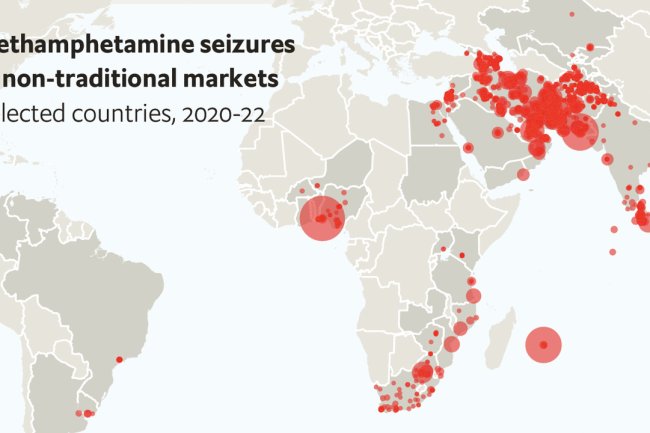China’s Export Curb on Chip-Making Metals Prompt Countries to Explore Supply-Chain Diversification
Beijing’s decision to curb exports of rare minerals alarms South Korea and Japan China has introduced export controls on gallium and another mineral that will take effect next month. Photo: Cfoto/Zuma Press By Jiyoung Sohn in Seoul, Yang Jie in Tokyo and Rhiannon Hoyle in Adelaide, Australia Updated July 5, 2023 12:36 am ET China’s move to limit exports of two key minerals is likely to accelerate moves to diversify supply chains away from the country, as governments and industries seek to limit fallout from the U.S. and China’s escalating economic rivalry. Industrial experts say China’s move—viewed as retaliation against U.S. export restrictions aimed at curbing Beijing’s high-technology


China has introduced export controls on gallium and another mineral that will take effect next month.
Photo: Cfoto/Zuma Press
China’s move to limit exports of two key minerals is likely to accelerate moves to diversify supply chains away from the country, as governments and industries seek to limit fallout from the U.S. and China’s escalating economic rivalry.
Industrial experts say China’s move—viewed as retaliation against U.S. export restrictions aimed at curbing Beijing’s high-technology industries—is unlikely to immediately hit global output of semiconductors and other products, in part because Beijing would be hurting its own technology industry if it implemented the controls too strictly. But it has sounded an alarm for countries that stand to be hit.
South Korea’s government held an emergency meeting on Tuesday to assess the potential consequences of China’s export restrictions on the two minerals, gallium and germanium, and pledged to do more to diversify its sourcing of materials critical to major industries like semiconductors. Japan’s government also said Tuesday that it is studying the impact of the restrictions. Both countries boast large semiconductor industries that would be exposed to a shortage of the two minerals.
China’s Foreign Ministry said the latest export controls, which kick in on Aug. 1, don’t target any specific countries. “China has always been committed to maintaining the security and stability of the global supply chain, and has always implemented fair, reasonable, and non-discriminatory export control measures,” spokeswoman Mao Ning said Tuesday.
The $53 billion Chips Act seeks to end the U.S.’s reliance on foreign-made semiconductors, especially those used by the Pentagon. It is the latest example of the federal government using its cash to remake an industry it sees as crucial to national security.
Meanwhile, a former senior Chinese official signaled that China could deploy further export control measures to exert leverage over other countries. In an interview published Wednesday in the state-run China Daily, Wei Jianguo, a former vice minister of commerce, said China’s latest export curbs are just a start and that China has sanction options should Washington impose stricter technology restrictions on Beijing.
Analysts said China’s measures, which restrict exports of the two minerals, as well as dozens of related compounds, appeared to be aimed at countries such as the U.S., South Korea and Japan, which have restricted exports of advanced semiconductors and related technology to China.
China mines and exports large quantities of gallium and germanium, providing the raw materials to countries such as the U.S. and Japan that process them into high-end products, which can then be used in manufacturing advanced semiconductors, military radars, LED panels, solar panels, electric vehicles and wind turbines. By contrast, China processes other minerals like cobalt, which are mined elsewhere.
China’s restrictions are the latest in a series of increasingly contentious trade-related measures that Beijing and Washington are unleashing as each seeks to dominate in core technologies with military and industrial applications. They amplify the pressure that other governments and many multinational companies face in a bid to reduce the impact from growing geopolitical risks. Governments and companies around the world have been pushing to shift some of their production and supply chains away from China, while some companies have begun siloing off China operations from the rest of the global business.
More export control measures are likely to come. The U.S. is likely to release in the coming weeks final and upgraded regulations related to export curbs of advanced chips and equipment that it announced in October, The Wall Street Journal has reported.

China could leverage its restrictions in discussions with U.S. Treasury Secretary Janet Yellen when she visits Beijing later this week.
Photo: Stefani Reynolds/Zuma Press
South Korea’s deputy minister for industrial policy at the Ministry of Trade, Industry and Energy, Joo Young-joon, said that the impact of China’s latest export controls is likely to be limited in the short term, but that uncertainties remain. “It’s unclear how long China’s export controls will continue and the possibility of the ban’s expansion to other items can’t be ruled out,” said Joo.
The government plans to further diversify sourcing routes for key materials and develop alternatives to materials for industries that are now highly dependent on imports from specific countries, Joo said. It will also develop recycling technologies for key minerals as part of its preparatory efforts, he said.
China’s announcement of the restrictions came days before Treasury Secretary Janet Yellen’s planned visit to Beijing later this week.
China could leverage its restrictions in discussions with Yellen, according to analysts at Eurasia Group, a risk consulting firm. Beijing’s move also serves as a warning shot “to remind countries including the United States, Japan, and the Netherlands that China has retaliatory options and to thereby deter them from imposing further restrictions on Chinese access to high-end chips and tools,” Eurasia’s analysts told clients in a note Tuesday.
Overall, the impact of China’s export restrictions on gallium and germanium is likely to be limited in the short term.
In South Korea’s semiconductor sector, gallium is used mainly for research and development of next-generation products, the country’s Trade Ministry said. Germanium goes into some gases used in semiconductor production, but it can be replaced with other materials and alternative import routes are available, the ministry said.
The compound gallium nitride, meanwhile, is used to make semiconductors that deal with high-voltage electrical flows, such as power-management chips widely used in cars and certain radio-frequency chips for telecommunication devices.
U.S. and European firms specializing in those types of chips could see a bigger impact down the road, while memory chip-driven South Korea is relatively shielded, said Ahn Jin-ho of Hanyang University who is a vice chairman of the Korean Institute of Metals and Materials.
Companies that produce power-management chips and automotive chips using semiconducting materials such as gallium nitride include U.S.-based chip makers Wolfspeed and NXP Semiconductors, as well as Germany’s Infineon Technologies. Wolfspeed and NXP couldn’t be reached for comment. Infineon said that while it can’t comment on specific materials, it currently doesn’t see a major impact that could disrupt its manufacturing capabilities.

Semiconductor testing equipment at the National Nanofab Center in Daejeon, South Korea.
Photo: KIM HONG-JI/REUTERS
Radio-frequency semiconductors, used in telecommunication devices, are dominated by U.S. and Japanese firms including
Broadcom, Qualcomm, Qorvo and Murata Manufacturing. These companies didn’t immediately respond to requests for comment. In addition to telecommunication base stations, radio-frequency semiconductors are also used in defense- and satellite-related applications.Even should disruptions occur, the metals and mining industry has longer-run options to help plug shortfalls in places such as the U.S. and Australia. Germanium and gallium are typically recovered as byproducts from zinc and alumina refineries.
These types of niche critical minerals, which can be costly to process, have long been overlooked by global miners in favor of industrial commodities that can be produced at scale. China has meantime exported them relatively cheaply, allowing the country to become the dominant supplier.
Nyrstar, which is owned by trading giant Trafigura Group and is the world’s No. two zinc producer, is considering building a $150 million facility to recover and process germanium and gallium at its zinc smelter in Clarksville, Tenn. The facility could produce enough of the metals to meet as much as 80% of annual U.S. demand, the Netherlands-based company said in emailed remarks on Tuesday.
“We are currently discussing the potential development with relevant government entities in order to finalize the business case and move forward with this investment as soon as practically possible,” the company said.
Nyrstar last month said it could also consider extracting germanium it has previously ignored at its Australian operations. Doing so would be of benefit to countries including the U.S., it said. The company’s estimates suggest it could account for roughly 5% of world production there if it did so.
There are substantial U.S. reserves of germanium in Alaska, Tennessee and Washington, and the U.S. is able to recycle new and old scrap, according to the U.S. Geological Survey. Some domestic zinc deposits could also hold a significant amount of gallium, the agency said in a report this year.
—Asa Fitch contributed to this article.
Write to Jiyoung Sohn at [email protected], Yang Jie at [email protected] and Rhiannon Hoyle at [email protected]
What's Your Reaction?

















